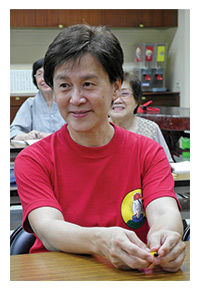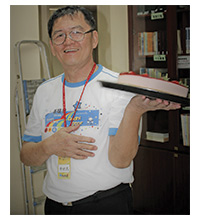Reflections On Chan-7 Retreat
Benjamin Manalese 黃世民(傳世)
Kennedy Tuazon (傳肯), 2012
The level of experience was a notch higher as I did a lot of bowing and listened to the penetrating and hair-raising chanting and beating of drums. I can also attribute my experience to my being one with the whole Sangha. I witnessed and appreciated the entry and exit formation of about 1,000 pious looking people, all wearing black robes. The formal lunch was done with contemplative demeanor as we were taught finer ways of eating from start to finish. Each time you bring food to your mouth, you think deeply of your blessings, the value of the food, the efforts put into its preparation, thus, not one bit should be wasted. Every sitting meditation for me meant I had to tolerate back and leg pains. I noticed that whenever I began to relax, one of my feet would ache or when I would eventually just give up, the bell would be struck in less than a minute or so, signaling the end of the session. The Dharma Masters reminded us that our minds must remain still and empty, devoid of delusions and other thoughts. The Grand Master warned us to disregard the various phenomena that may occur during meditation as well as to keep in mind that Zen is about getting rid of the three poisons above all else. On the other hand, while some practitioners openly complain about the pain, the Abbot emphasized that the purpose of the seven-day meditation sessions was to basically train the Buddha Mind which comes in many names but refers to only one and the same concept—the Buddha Nature. And the lotus position can be developed through practice and can keep the body upright and stable. He explained that Nirvana or enlightenment does not happen suddenly like a strike of lighting, but may manifest through constant cultivation. In conclusion, I have a renewed appreciation for disciplined and structured inner introspection and self awareness method and I will recommend the Chan-7 Retreat to all serious Zen practitioners for it will solidify your practice. |
Lolita Lutanco 李麗兒(傳醒), 2009
My first Chan-7 in 2007 was beset by sleepiness, excruciating pain in the legs, and non-stop thoughts. To say the least, the whole experience was dismal, at the same time, traumatic. I remember asking myself in the middle of that retreat, “What have I gotten myself into?” 2009’s Chan-7 seemed like it was going to proceed the same way, only this time, no more sleepiness. I made sure that I followed the Grandmaster’s, Abbot’s and Vice Abbot’s Dharma talks to the letter, for they served as the foundation of the whole retreat and the backbone of my practice. Their words of wisdom guided, encouraged and helped me stay on the right track. The Conducting Master emphasized the breath counting method followed by the Middle Way Reality method. So, every sitting period, I would religiously count my exhalation; often defeated by the pain in my legs, or sidetracked by busy thoughts. Finally, on the 4th day, during the 8am sitting, after counting breaths for some time, it suddenly hit me!—an aura of calmness descended upon me; my whole being became so still, but my mind was very lucid and clear—no ripples of thoughts, no traffic of ideas and having full awareness of the sounds and movements around me. Sitting there was just so natural that I did not even mind the numbness in my legs. THAT was the start of several “good incenses” of sitting, so to speak. I am eternally grateful to all the people who made my Chan-7 experience so meaningful—to all the volunteers who toiled behind the scenes, making sure that our retreat was so orderly and comfortable; to all the supervising masters who were so patient and hardworking; to all the masters in the kitchen, for the timely sustenance; to the Abbot and Vice Abbot, for their words of wisdom; and to the Grandmaster, for his vision and compassion. So, who’s drinking the tea? At the end of seven days of backbreaking sitting, I guess it’s easy to answer—it is this PURE MIND that’s drinking the tea. To fully realize this pure mind, I will have to let go of so many attachments, cravings, and delusions in order to come to rest on this pure mind, this thing called Bodhi or Nirvana. Now, the real work begins. |
Benjamin Manalese 黃世民(傳世)
When I joined the first time, everything was so new to me. For example, we had to enter the Chan hall when the bell struck; or when we used the toilet, we had to remove the black robe. Or, the formal meal was eaten in silence, and many more. We were also doing everything according to schedule that sometimes I could hardly catch up. Even the unfamiliar accent of the Grand Master when he gave his Dharma Talk was difficult to understand. I have since joined the Chan-7 two more times. On the third time, I was more comfortable, I had improved a lot. As I got familiar with the routine, I could relatively understand what was going on around me. My mind had become calmer and my body more relaxed. Thus, I could easily participate in the activities right from the first incense. What was obscure before was now clearer in my mind. I came to savor every dish that was provided during the formal meal. Despite my progress, I noticed that I was not as attentive or as compliant as during my first seven-day retreat. Because everything was familiar, I became careless and unmindful. This is one area where I feel remorseful and wish to rectify. I encourage everyone to experience the Seven-Day Meditation and enjoy the benefits of Chan cultivation. Should you have any queries, I will sincerely and gladly do my best to help you. --------------------------------------------------------------------------- 七日的禪修,令人心安,心定! |

 Towards the end of the bitter, cold January in Taiwan, I had my first taste of the Seven-Day Chan Meditation Retreat. I immediately observed how systematic the procedures were while the activities were all carried out in a peaceful and orderly manner.
Towards the end of the bitter, cold January in Taiwan, I had my first taste of the Seven-Day Chan Meditation Retreat. I immediately observed how systematic the procedures were while the activities were all carried out in a peaceful and orderly manner.  “So who’s drinking the tea?” The Conducting Master (the Abbot) thrust the question at us at the start of 2009’s spring Seven-Day Meditation Retreat—an assignment that we had to contemplate on, in my second attempt to find the Bodhi Mind.
“So who’s drinking the tea?” The Conducting Master (the Abbot) thrust the question at us at the start of 2009’s spring Seven-Day Meditation Retreat—an assignment that we had to contemplate on, in my second attempt to find the Bodhi Mind. The Seven-Day Meditation Retreat enables one to acquire a calm and tranquil mind.
The Seven-Day Meditation Retreat enables one to acquire a calm and tranquil mind.